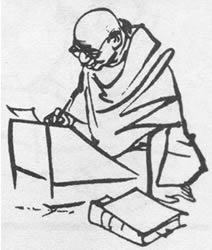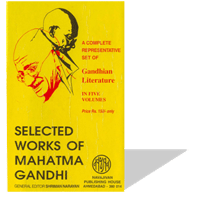
P.O. SEVAGRAM, DIST.WARDHA 442102, MS, INDIA. Phone: 91-7152-284753
FOUNDED BY MAHATMA GANDHI IN 1936
SECTION II : Extracts From Letters
[ from Selected Works of Mahatma Gandhi : Vol - 4 ]

SELECTED LETTERS
from
Selected Works of Mahatma Gandhi
Volume IV
Table of Contents
- Foreword
- Publisher's Note
SECTION I : LETTERS
- 1. To Dadabhai Naoroji
- 2. To G. K. Gokhale
- 3. To G. K. Gokhale
- 4. To Tolstoy
- 4A. From Count Leo Tolstoy
- 5. To Count Leo Tolstoy
- 6. To Leo Tolstoy
- 6A. From Count Leo Tolstoy
- 7. To Leo Tolstoy
- 7A. From Count Leo Tolstoy
- 8. To Maganlal Gandhi
- 9. To Maganlal Gandhi
- 10. To Narhar Shabhurao Bhave
- 11. To Mr Maffey, Private secretary To Viceroy
- 12. To W. B. Heycock
- 13. To Shankarlal on Ideas About Satyagraha
- 14. To Vinoba Bhave
- 15. To C F Andrews
- 16. To C F Andrews
- 17. To C F Andrews
- 18. To Kasturba Gandhi
- 19. To Kishorelal Mashruwala
- 20. To Sarojini Naidu
- 21. To Srinivas Sastri
- 22. To Srinivas Sastri
- 23. To Rabindranath Tagore
- 23A. From Rabindranath Tagore
- 24. To Rabindranath Tagore
- 25. From Rabindranath Tagore
- 25A. To Rabindranath Tagore
- 26. From Rabindranath Tagore
- 26A. To Rabindranath Tagore
- 27. To Rabindranath Tagore
- 28. To Rabindranath Tagore
- 29. To Rabindranath Tagore
- 30. To Rabindranath Tagore
- 31. To Rabindranath Tagore
- 32. From Rabindranath Tagore
- 32A. To Rabindranath Tagore
- 33. From G S Arundale
- 33A. To G S Arundale
- 34. To Every Englishman In India
- 35. To Viceroy
- 36. To Jawaharlal Nehru
- 37. To Jawaharlal Nehru
- 38. To Jawaharlal Nehru
- 39. To Jawaharlal Nehru
- 40. From Jawaharlal Nehru
- 41. To Jawaharlal Nehru
- 42. To Konda Venkatappayya
- 43. To T Prakasam
- 44. To Hakim Ajmal Khan
- 45. To Jamnalal Bajaj
- 46. To Mohomed Ali
- 47. To Motilal Nehru
- 48. To Motilal Nehru
- 49. To C Rajagopalachari
- 50. To C Rajagopalachari
- 51. To Kakasaheb Kalelkar
- 52. To A Friend
- 53. From Madeleine Slade or Miraben
- 53A. To Madeleine Slade
- 54. To Romain Rolland
- 55. To Romain Rolland
- 56. To Shri Shankaran
- 57. To Hermann Kallenbach
- 58. To Gulzarilal Nanda
- 59. To Dr Kailas Nath Kaju
- 60. To Dhan Gopal Mukherjee
- 61. To Henry S Salt
- 62. To The Viceroy
- 63. To Lord Irwin
- 64. To Reginald Reynolds
- 65. To Richard B Gregg
- 66. To Sir Samuel Hoare
- 67. To Ramsay MacDonald
- 68. To Pandit Malaviyaji
- 69. To The Secretary To The Government of Bombay, (Home Dept.), Poona
- 70. To Sir Tej Bahadur Sapru
- 71. To Carl Heath
- 72. To Carl Heath
- 73. To Carl Heath
- 74. To M A Jinnah
- 75. To M A Jinnah
- 76. To M A Jinnah
- 76A. From M A Jinnah
- 77. To M A Jinnah
- 78. From Subhash Chandra Bose
- 78A. To Subhash Chandra Bose
- 79. To Herr Hitler
- 80. To Every Briton
- 81. To Every Briton
- 82. To Generalissimo Chiang Kai-Shek
- 83. To Every Japanese
- 84. To American Friends
- 85. To Lord Linlithgow
- 86. To Lord Linlithgow
- 86A. From Lord Linlithgow
- 87. To Lord Linlithgow
- 87A. From Lord Linlithgow
- 88. To Lord Linlithgow
- 88A. From Lord Linlithgow
- 89. To Lord Linlithgow
- 90. To Agatha Harrison
- 91. To Winston Churchill
- 92. To Shriman Narayan
- 93. To Lord Pethick Lawrence
- 94. To Sardar Vallabhbhai Patel
- 95. To The Viceroy
- 96. To The Viceroy
- 96A. From Lord Mountbatten
- 97. To Abdul Ghaffar Khan
- 97A. From Abdul Ghaffar Khan
- 98. To A Friend
- 99. To Madame Edmond Privat
- 100. To The People of Gujarat
- Appendix I: Who Should Be Provincial Governors?
- Appendix II: A Psychological Explanation
- Appendix III: The Gandhian Constitutions for Free India
SECTION II : EXTRACTS FROM LETTERS
- Faith in God
- Religions and Scriptures
- Value of Prayer
- Truth and Non-violence
- The Science of Satyagraha
- Fasting in Satyagraha
- Unto This Last
- Khadi and Village Industry
- East and West
- Hindu-Muslim Unity
- Upliftment of Women
- The Good of All
- India's Freedom
- Education
- Caste System and Untouchability
- Brahmacharya
- Fearlessness
- Health and Hygene
- Self-restraint
- Self-development
- Selfless Service
- Voluntary Poverty
About This Volumes

Selected Works of Mahatma Gandhi comprises of Five volumes.
- Vol-I: Autobiography
- Vol-II: Satyagraha in South Africa
- Vol-III: Basic Works
- Ethical Religion
- Unto This Last
- Hind Swaraj or Indian Home Rule
- From Yeravada Mandir
- Discourses on the Gita
- Constructive Programme
- Key to Health
- Vol-IV: Selected Letters
- Vol-V: Voice of Truth
This book, Selected Letters, is volume-4.
Written by : M. K. Gandhi
General Editor : Shriman Narayan
Volume
Selected Works of Mahatma Gandhi : A set of five books
ISBN: 81-7229-278-3 (set)
Printed and Published by :
Jitendra T. Desai
Navajivan Mudranalaya,
Ahemadabad-380014
India
© Navajivan Trust, 1968
Download
Chapter 6: Fasting in Satyagraha
I do not know any contemporary of mine who has reduced fasting and prayer to an exact science and who reaped a harvest so abundant as I have. I wish that I could infect the nation with my experience and make it resort to fasting and prayer with intelligence, honesty and intensity. We would thus, incredible as it may appear, do millions of things pertaining to the nation without elaborate organization and checks upon checks, but I know that fasting and prayer, to be as effective as I have found them to be in my own experience, have to be not mechanical things but definite spiritual acts. Fasting then is crucifixion of the flesh with a corresponding freedom of the spirit and prayer is a definite conscious longing of the soul to the utterly pure—the purity thus attained being dedicated to the realization of a particular object which is in itself pure.
The Collected Works of Mahatma Gandhi -Vol. XVII, p. 104, 20-3-1920
Fasting in Satyagraha has well-defined limits. You cannot fast against a tyrant, for it will be as a piece of violence done to him. You invite penalty from him for disobedience of his orders, but you cannot inflict on yourself penalties when he refuses to punish and ren¬ders it impossible for you to disobey his orders so as to compel infliction of penalty. Fasting can only be restored to against a lover, not to extort rights but to reform him, as when a son fasts for a parent who drinks. My fast at Bombay, and then at Bardoli, was of that character. I fasted to reform those who loved me. But I will not fast to reform, say, General Dyer who not only does not love me, but who regards himself as my enemy.
The Collected Works of Mahatma Gandhi -Vol. XVIII, p. 420, 12-4-1924
What you say about fasting is quite true. It has no absolute value and it certainly does not produce the slightest spiritual effect if the motive behind it is not really spiritual. Fasting with a mixed motive ends with purely material results. But fasting for the sake of unfoldment of the spirit is a discipline I hold to be absolutely necessary at some stage or other in the evolution of an individual. I always considered Protes¬tantism to be deficient in this particular. Every other religion of any importance appreciates the spiritual value of fasting. Crucifixion of the flesh is a meaningless term unless one goes voluntarily through pangs of hunger. For one thing, identification with the starving poor is a meaningless term without the experience behind. But I quite agree that even an eighty days' fast may fail to rid a person of pride, selfishness, ambition and the like. Fasting is merely a prop. But as a prop to a tottering structure is of inestimable value, so is the prop of fasting of inestimable value for a struggling soul.
My Dear Child, p. 85, 20-8-1926
Fasting should be inspired by perfect truth and perfect non-violence. The call for it should come from within and it should not be imitative. It should never be undertaken for a selfish purpose, but for the benefit of others only. A fast is out of the question in a case where there is hatred for anybody. But what is the inner voice? Is every one capable of hearing it? These are big questions. The inner voice is there in every one of us, but one whose ears are not open for it cannot hear it, just as a deaf person is unable to hear the sweetest of songs. Self-restraint is essential in order to make our ears fit to hear the voice of God.
Selected Letters-II, pp. 46-47, 30-10-1932
The fast has become the normal course of my life. It is the spiritual medicine applied from time to time for diseases that yield to that particular treatment. Not everyone can gain the capacity for it all of a sudden. I have gained it, if I have, after a very long course of training.
Bapu's Letters to Mira, p. 228, 8-12-1932